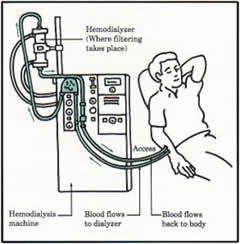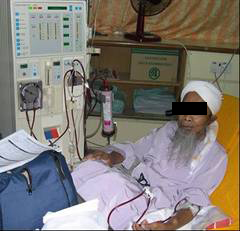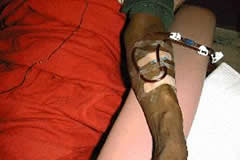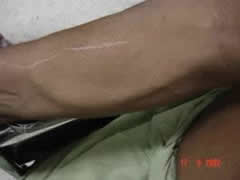What is the prevalence of ESRF patients on haemodialysis in Malaysia?
The number of dialysis patients in Malaysia has been increasing every year and was almost 23,000 at the end of 2010 (18th report of the Malaysian Dialysis and Transplant Registry 2010)
What is Hemodialysis?
Haemodialysis is a modality of renal replacement therapy. This mode of dialysis is carried out via a haemodialysis machine three times per week with a minimum of four hours per session at a haemodialysis center or at home. Haemodialysis requires the creation of a vascular access (see relevant section below).

Two needles will be inserted in your arm along the fistula and you will be connected to a haemodialysis machine. One needle will remove blood containing waste products from the body. This blood will be cleansed by the artificial kidneys attached to the haemodialysis machine. The clean blood is subsequently returned back to the patient via the other needle.

What is a vascular access?
A permanent vascular access is a vein which has been surgically connected to an artery to enable it to enlarge and to provide adequate blood flow during dialysis. This vascular access is called a native AV fistula when one’s own vessels are used, On the other hand, a synthetic graft ( a tubular device resembling a vein) can be implanted for the same purpose.
People with advanced chronic kidney disease are advised to prepare for dialysis before it is needed and therefore are advised to have the fistula created several months before it is to be used. People who avoid preparation of this permanent vascular access are at greater risk for short-term and long-term complications when they begin dialysis urgently.

A native fistula that has developed and is being used for haemodialysis. This should be the first choice of vascular access as compared to a vasculargraph (see below)

Is there any selection criteria for hemodialysis?
There are various socio-economic factors which have to be considered.
These include :
- Access to haemodialysis facilities
- Family support
- Financial support
- Patient’s preference
- Presence of any conditions which would cause increased risk to you i.e contraindications (please see the last section)
Where can I go to get haemodialysis?
There are various haemodialysis providers in Malaysia. These include Ministry of Health hospitals, non-governmental organization centers, private hospitals and dialysis centres, university-based centers and armed forces centers.
How do I know that I have to begin dialysis?
Please consult a nephrologist to help you start dialysis when it is appropriate/required.
The need for dialysis is indicated by various factors :
- Symptoms of uremia – poor appetite, nausea, vomiting, fits, altered level of consciousness
- Blood tests – high creatinine, high urea or high level of potassium
- The development of fluid overload – swelling of body, face and limbs, difficulty in breathing
- The development of malnutrition or anemia
- A development of metabolic acidosis
- The glomerular filtration rate of less than 10 mls/min (your doctor will intermittently check the degree of your kidney function)
What are the contraindications to haemodialysis?
- Haemodynamic or circulatory instability
- Advanced cancer
- Incapacitating end stage organ failure for example dementia
- Severe vascular access problems
- Advanced AIDS
In addition, dialysis may not be appropriate for someone with advanced cancer with a very short anticipated lifespan and poor quality of life or an incapacitating, irreversible disorder such as severe dementia. However, this is decision that need to be made by the individual or his closest relative(s)
Support group
Malaysian Society of Nephrology – www.msn.org.my.
National Kidney Foundation of Malaysia – www.nkf.org.my.
| Last reviewed | : | 25 April 2012 |
| Writer | : | Dr. Anita Bhajan Manocha |
| Reviewer | : | Dr. Sunita a/p Bavanandan |







